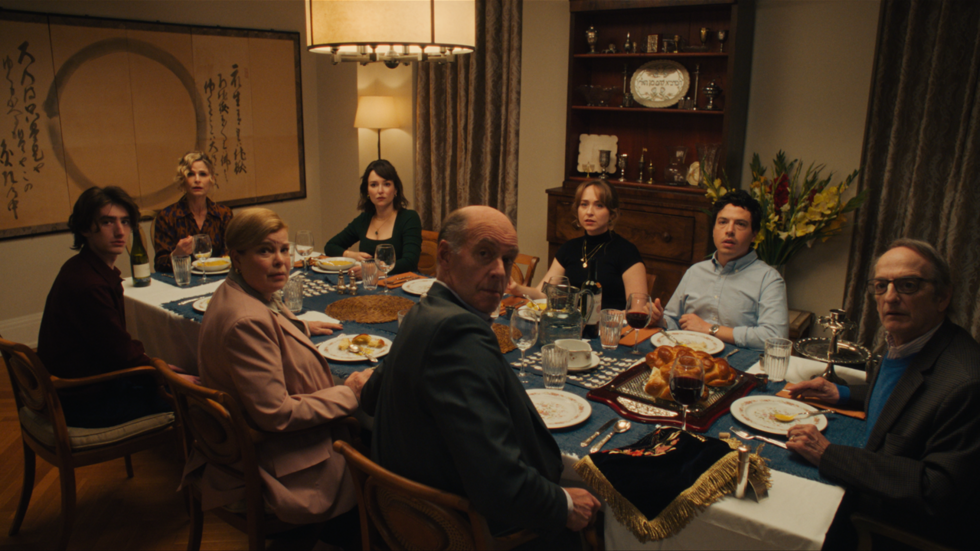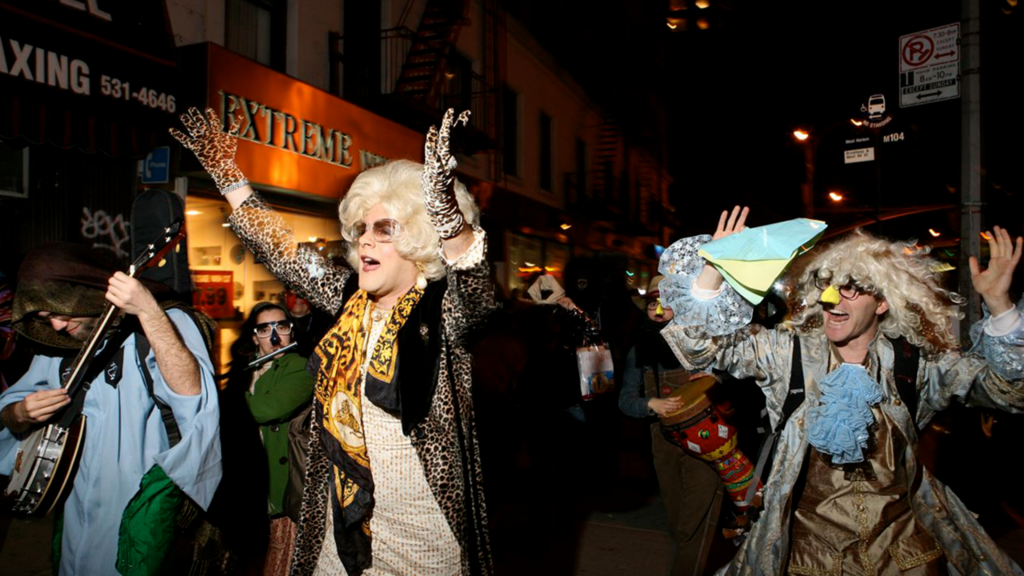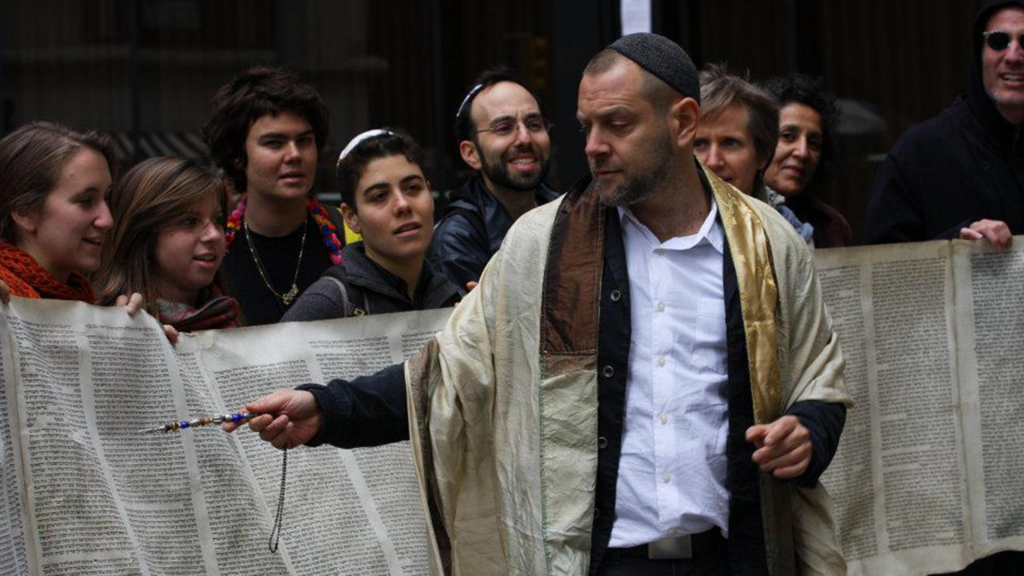Being an Israeli film director these days isn’t easy when the international cinema community has largely ostracized the country’s leaders, representatives and artists due to the war in Gaza. At this stage, the boycott of Israeli-made films hasn’t been officially declared, as in Russia’s case, but fewer and fewer international festivals are inviting blue-and-white creations to their programs, some going as far as throwing them out to avoid the unnecessary headaches of protests and demonstrations.
The increased openness to dramas and comedies branded as Jewish would seem surprising. The organizers, after all, are supposed to be “antisemitic” (and they’re not). This comes as less of a surprise in the United States where the Jewish community is regarded as a stable market share for ticket sales for waning independent cinema. So, it’s little wonder that a for-profit organization such as the Tribeca Film Festival in Manhattan is hosting no less than five Glatt kosher films. Despite all the pro-Palestinian demonstrations in the city, New York is a natural environment for Jews – and safer than it would seem, even right now. Even Tom Nesher’s Israeli drama, Come Closer premiered there and even won the Viewpoints Award, the top prize in its category.
Tom Nesher is the daughter of Israeli cinema icon Avi Nesher. But despite the family connection and collaboration, the young director has taken her first film in a totally different technical and style direction. It’s more economical, modest and intimate, and less professional – in a good way.
This coming-of-age drama delicately addresses a noisy character, striving to be larger than life. The plot was inspired by Nesher’s brother Ari’s death in a traffic accident in September 2018, shortly after his 17th birthday. The terrible disaster was a national tragedy and the entire public lovingly embraced the grieving family.
In her directorial debut, Nesher is drawn to her personal experience via the main character, a charismatic young woman with an array of bright colors adorning her clothes, hair and makeup. These colors are loud and bright, but her cry is voiced through different shades of emotions.
Eden (played by Lia Elalouf) is a total party girl. Her fondness for extreme experiences and sensations is in full view in the film’s opening scene as she “kidnaps” her younger brother, Nati for a wild birthday party he’ll never forget. The following day, she learns that the events she organized will be forever remembered: Nati is killed in a traffic accident in the dead of night after sneaking off far away from the unplanned part.
Congratulations turned to commiserations. Eden is obviously the director’s character, but she doesn’t aim to reproduce her family tragedy’s actual circumstances. Even the driver who ran over Nati isn’t mentioned. Come Closer delves into her personal experience through a whirlwind of emotions into which she drifts, and all the to the bottom. Working on this beautiful film may well have brought her back to the surface to breathe.
Eden’s hectic daily, or rather nightly, routine suggests a borderline personality disorder with an unquenchable thirst for adventure. She frequently oscillates between fake highs and dark lows. Her immediate response to her beloved brother’s death is partying till she can party no more. The release of dancing in clubs, saturated in drink and drugs, provides her with momentary comfort and she tries stretching it with wild sexual encounters with a married man (Shlomi Shaban). She’d already given up on her disintegrated family (Neta Garty as the unstable mother and Yaakov Zada-Daniel as the distant father). Although she finds a substitute father in her much older lover, she can’t fill the sudden void in her life. The substitute brother is herself as she envelops herself in his character, wearing his clothes and trying to meet up with his secret girlfriend Maya (Daria Rosen).
The relationship between the two – the exaggerated sister and the shy girlfriend grows closer and deeper. A little too close and too deep. Hesitant Maya is nurtured by Eden’s craziness who regards her new friend as her brother’s living tombstone. Nesher offers an interesting development of processing the death of a loved one, a familiar motif in Israeli cinema – mainly in dealing with loss on the battlefield.
The film oscillates between wild and intimate, grandiose and gentle as daring, charismatic Elalouf (who also appears nude in the film) is the engine powering this roller coaster, invariably at full speed. Some moments she shares with Rozen are not truly balanced and drift to the overdramatic. But as a whole, Come Closer is an impressive debut work by a promising director who, being daring and independent, doesn’t fear honesty and exposure, detached from the family's original story and her father’s cinematic legacy.
The light side of American Jewishness
Like in Nesher’s film, the instigating event in Between the Temples, directed by Nathan Silver, is also a tragic death. In the whimsical independent work that premiered at Sundance, Jason Schwartzman plays a widowed cantor who has lost his voice. He finds new meaning in life when an aging woman (Carol Kane) asks him to prepare her or her Bat Mitzva. The film’s New York premiere was held at Tribeca and ranges from drama and comedy, appealing to the Jewish audience, and can expect the same box office success as Golda, One Life and Irena’s Vow.
From Treasure
The same goes for Julia von Heinz’s Treasure, first shown at the Berlin Film International Festival in which a bitter-sweet trip to Poland with Jewish journalist (Lena Dunham) and her Holocaust survivor father (Stephen Fry).
The plot of Bad Shabbos, which held its world premiere at Tribeca takes place over a single nutty Friday night, again appealing to the Jewish audience. Daniel Robbins' sitcom is replete with Yiddishkeit, rather a lot of stereotypes and a great deal of characteristically typical self-deprecating humor and he makes kosher and treif lokshen out of Jewish tradition and commandments.
The event starts with kiddush and ends with kaddish. And between the two we witness a chain reaction around the dinner table, on the front doorstep, in the bathroom. With their wedding approaching, David (Jon Bass) and his Christian sweetheart Meg (Meghan Leathers) (Meg) come for Friday night dinner. The protective mother (Kyra Sedgwick) finds it hard to accept the good-hearted shiksa and the young son Adam (Theo Taplitz) finds it hard to come to terms with her sister’s (Milana) choice to share her life with a man who’s Jewish, but an SOB (Ashley Zukerman, Succession). A nasty trick he sets off culminates in the grotesque death of his future brother-in-law, who is then relegated to the past.
As the plot thickens, the hysterical family can’t deal with the situation which has gotten out of control and could send them all to jail just before the wedding. To get themselves out of this predicament, they lie, invent commandments written nowhere in the Torah and distort Halacha.
At the end of the day, it’s the gentiles of the group who get them out of this sticky situation – the very same self-composed shiksa and the Afro-American doorman (Rapper Method Man). Robbins takes the liberty of playfully manipulating archaic Jewish heritage and benefits from the talented performances of actors such as Sedgwick and David Paymer.
We first meet young Adam in an IDF shirt, training for conscription comes across naturally. It may cause some discomfort, however among anti-Israeli elements in the audience. Conversely, this is the Jewish audience likely to get upset by making fun of Jewish heritage and encouraging assimilation.
The flexibility required in Hallacha, at least according to the strict version imposed on the Jewish People by its Haredi wing, takes center stage in Sandi Simcha Dubowski’s documentary film, Sabbath Queen. Filmed over years, the feature documentary follows Rabbi Amichai Lau-Lavie, Ashkenazi Chief Rabbi David Lau’s cousin, from an illustrious lineage (claiming 38 generations of rabbis since the 11th century). His coming out was regarded as a deviation from his respectable lineage and his activity in the Jewish LGBT community as a spiritual and political leader was a true act of defiance against the Orthodox establishment and, to a great extent, against his family.
Lau-Lavie, who was born and raised in Israel explains how a prayer event of both men and women at the Western Wall in the 1980s shaped his critical understanding of religion. A violent attack on the part of Yeshiva students and the support they received from the police raised doubts about Orthodoxy’s destructiveness. He then set out protesting against it, starting with supporting Women of the Wall, and then founding a Beit Midrash for the gay community. He talks about the existential crisis he endured after being outed without his permission by a journalist in 1993.
After this, he left for New York where he was received by a gay community called the Radical Faeries, who adhere to Paganism where he discovered he could be both queer and spiritual. With inspiration from his new friends, he created Hadassa Gross, a grotesque character of an Orthodox Jewish widow of Hungarian heritage.
Lau-Levie’s personality is fascinating, whether or not you agree with his progressive ideas. His charisma, and courageous leadership are inspiring. In effort to stay connected to his roots, he founded the Storahtelling program, a series of dramatic adaptations of Torah stories. He later turned to a more organized Torah route, studying and the Jewish Theological Seminary (JTS) in New York. This step surprised some of his progressive friends in the gay community, but he insisted on official rabbinic ordination to, as he puts it, influence from the center.
However, his activities as a rabbi, in particular one allowing for single-sex weddings between Jews and non-Jews constituted an irregularity so extreme that he was forced to resign from the local council of progressive rabbis., He nonetheless carries on to his brother, Benny Lau’s, chagrin. “He shouldn’t hide in a closet. A closet is a coffin. A coffin is death. A rabbi is a leader, but where are the boundaries?”
It's unclear whether Lavie-Lau has defined boundaries, but he recognizes the need for rules as a religious infrastructure and works in accordance with it, but removed from the Orthodox interpretation, and insists on flexibility in keeping with the times. He warns that Judaism as we know it is becoming more conservative than ever – Haredi coupled with a right-wing ideology that sanctifies war over peace. From this position, he participates in political activities supporting the Palestinians and against the Israeli government’s policies. Dubowski introduces political discourse into the film with a segment of a speech by Benjamin Netanyahu riling up a right-wing crowd during the 2014 Gaza war (Zuk Eitan) declaring, “There’s no place for weaklings in our neighborhood. They attack the weaklings, and don’t mess with the strong. That’s how it is in nature.”
On the streets of Manhattan on the other side of the globe, Lavie-Lau is filmed confronting pro-Zionist demonstrators, holding a sign calling for compassion for victims in Gaza. Nine years later, he visits Israel on October 7. A segment is inserted into the film at the last minute. “I live the pain of my Israeli brothers,” he says, looking at the posters of the hostages.
“But our traumas and desire for security don’t justify starving and killing hundreds of thousands of Palestinians. Alongside calling for a deal to bring back the hostages and bilateral permanent cease-fire, he asks how we can go back to the original Jewish heritage, the one seeking peace. The one that, instead of devoting itself to the past, to reclaiming former glory, would rather look forward to devoting itself to a better future, breaking the cycle of war as part of the family of humanity and for the sake of future generations. This vision may seem far-fetched these days. But no less far-fetched than the Sabbath Queen’s complex character.








